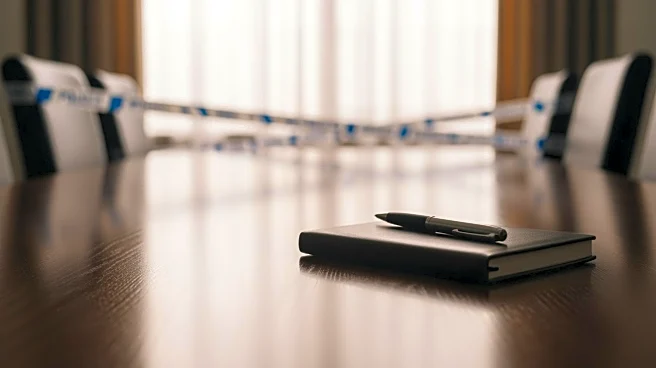What's Happening?
BBC director general Tim Davie and CEO of News Deborah Turness have resigned following allegations that a BBC Panorama documentary misled viewers by editing a speech by US President Trump. The controversy arose from an internal whistleblowing memo, which
claimed the documentary altered Trump's speech to suggest he encouraged Capitol Hill rioters. The memo, seen by The Telegraph, accused the BBC of splicing footage to make it appear that Trump said things he did not. In reality, Trump stated during his January 6, 2021 speech in Washington DC that they would walk to the Capitol to cheer on senators and congressmen. The BBC has faced significant backlash, with Trump’s press secretary labeling the organization as '100% fake news' and a 'propaganda machine.'
Why It's Important?
The resignation of top BBC leaders underscores the serious implications of media integrity and the potential impact of misinformation. This incident highlights the challenges faced by media organizations in maintaining credibility and the consequences of perceived bias. The scandal has sparked criticism from political figures, including President Trump's son, Donald Trump Jr., who condemned the BBC's actions. The controversy may affect public trust in media outlets and influence perceptions of media bias, particularly in politically charged contexts. It also raises questions about editorial practices and the ethical responsibilities of media organizations in accurately representing public figures.
What's Next?
The BBC is likely to face increased scrutiny and pressure to review its editorial processes to prevent similar incidents. The organization may implement stricter guidelines and oversight to ensure accurate reporting. Additionally, the scandal could prompt broader discussions within the media industry about accountability and transparency. Political leaders and media watchdogs may call for investigations or reforms to address concerns about media bias and misinformation. The BBC's response and any subsequent actions will be closely watched by stakeholders, including the public, media analysts, and political figures.
Beyond the Headlines
This incident may contribute to ongoing debates about the role of media in shaping public opinion and the ethical considerations involved in reporting on political events. It highlights the potential for media narratives to influence political discourse and the importance of safeguarding against manipulation. The scandal may also lead to discussions about the impact of media on international relations, given the involvement of a major UK broadcaster in a controversy related to a US political figure.















